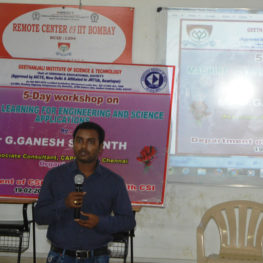Start
End
Machine Learning for Engineering and Science Applications Workshop
A Five day workshop on Machine learning for engineering and science applications was organized by the department of CSE, from 19th to 23th February 2018 in collaboration with CSI. The resource person Mr. G .Ganesh Sumanth explained various concepts of Machine Learning related aspects right from the fundamentals for II year II Semester B.Tech CSE students.
The Principal of GIST, Prof. Dr. G.Subba Rao, in the inaugural address also mentioned the demand of Machine Learning Engineers in the related fields of Computers. The head of the Department of CSE, Dr.Y.Jahnavi, Ms.P.Radhika, Assistant. Professor and faculty members of CSE also took part in the workshop actively.
The workshop started with a presentation on Machine Learning and its related fields where opportunities are abundant in the industry.The workshop resource person initially focused on Machine Learning for Engineering and Science Applications. The students got a chance to learn in depth about programming methodologies, debugging techniques and code dumping processes, thoroughly. Meanwhile the queries raised by the students were also answered in an efficient way in all the sessions by the resource persons.
The workshop participants were able to successfully code and run their programs dynamically on hardware with ease after completion of the main sessions of the first module. In detailed demonstrations were given on various Applications and techniques. The workshop turned out to be a major successful event, imparting lot of knowledge about Machine Learning and how to work with various Science Applications.
The Outcome of ML workshop
- Mathematical Basics 1 – Introduction to Machine Learning, Linear Algebra
- Mathematical Basics 2 – Probability
- Computational Basics – Numerical computation and optimization, Introduction to Machine Learning packages
- Linear and Logistic Regression – Bias/Variance Tradeoff, Regularization, Variants of Gradient Descent, MLE, MAP, Applications
- Neural Networks – Multilayer Perceptron, Back propagation, Applications
- Convolutional Neural Networks 1 – CNN Operations, CNN architectures
- Convolution Neural Networks 2 – Training, Transfer Learning, Applications
- Recurrent Neural Networks – RNN, LSTM, GRU, Applications
- Classical Techniques 1 – Bayesian Regression, Binary Trees, Random Forests, SVM, Naïve Bayes, Applications
- Classical Techniques 2 – k-Means, kNN, GMM, Expectation Maximization, Applications
- Advanced Techniques 1 – Structured Probabilistic Models, Monte Carlo Methods
- Advanced Techniques 2 – Autoencoders, Generative Adversarial Networks






